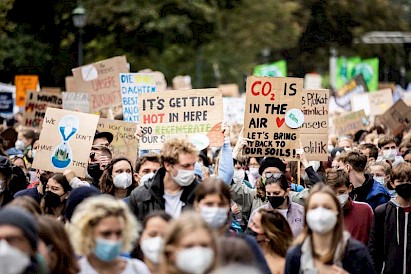Germany’s new coalition government may boost climate change action
 A new German government is expected to be far more ambitious on climate change, with extra support for renewables and action against fossil fuels. But the three parties hoping to form a coalition must first compromise on different visions of how to do that, which could take months.
A new German government is expected to be far more ambitious on climate change, with extra support for renewables and action against fossil fuels. But the three parties hoping to form a coalition must first compromise on different visions of how to do that, which could take months.
Against a backdrop of climate change protests in German cities on 24 September, the centre-left Social Democratic Party (SPD) won 25.7 per cent of the vote on 26 September, narrowly beating the incumbent conservative Christian Democratic Union-Christian Social Union (CDU-CSU) group.
Olaf Scholz, the SPD’s candidate to lead Germany, who pitched himself as the “climate chancellor” during the election campaign, has claimed victory and said he wants to form a coalition with the Green party, which won a record share of the vote, and the liberal Free Democratic Party (FDP).
Climate change will be at the top of the agenda in those coalition talks. “It was quite remarkable because climate change was one of the top two issues at the centre of the election campaign,” says Martin Kaiser at Greenpeace Germany. Apart from the far right, all the political parties in the campaign committed to meeting the Paris Agreement’s goal of holding the global temperature rise to 1.5°C, says Niklas Höhne at the NewClimate Institute in Germany.
On the table in the talks are the future of Germany’s domestic carbon pricing schemes, bringing forward its belated 2038 coal phase-out date and how to issue stronger support for wind and solar power.
“If they are serious, they must get serious now,” says Ottmar Edenhofer at the Potsdam Institute for Climate Impact Research in Germany. “The new government must tackle a targeted energy tax reform, make the CO2 price the guiding instrument, introduce a fair social compensation in the CO2 price and create a strong expansion of renewable energies.”
However, the three parties will have to compromise on political differences. The FDP has said the only approach for climate action should be carbon pricing, ruling out regulations such as a ban on new petrol and diesel car sales. By contrast, the Greens want a ban by 2030. “I don’t know if that will happen. It’s a challenge,” says Höhne. The Greens have also said they won’t form a government without a major shift on climate action, says Kaiser.
For Höhne, the biggest issue is the targets the coalition sets for how much new wind and solar power capacity it plans to build each year. Annual growth in renewable power has stagnated under chancellor Angela Merkel’s government in recent years.
Another question is whether to bolster Germany’s new carbon pricing scheme for buildings and transport, which the Green party wants to see raised from €25 a tonne of carbon dioxide to €65. The parties at least agree on how the revenues of the scheme should be redistributed, on a per capita basis that should benefit society’s poorest.
A government isn’t expected to take shape until Christmas at best, but the coalition could still influence the COP26 climate summit in November. Kaiser says the incoming government could tell the current one that it is willing to support a global coal phase-out statement being prepared by the UK, which is hosting the conference in Glasgow.
Whatever the fine print of the coalition agreement, a greener Germany is expected. “This election is good news for the climate compared to the previous government,” says Höhne. Kaiser says time will tell whether Scholz delivers on his promise of being a climate chancellor, a title he says Merkel failed to earn. “Herr Scholz needs to deliver on it,” he says.
You can return to the main Market News page, or press the Back button on your browser.

